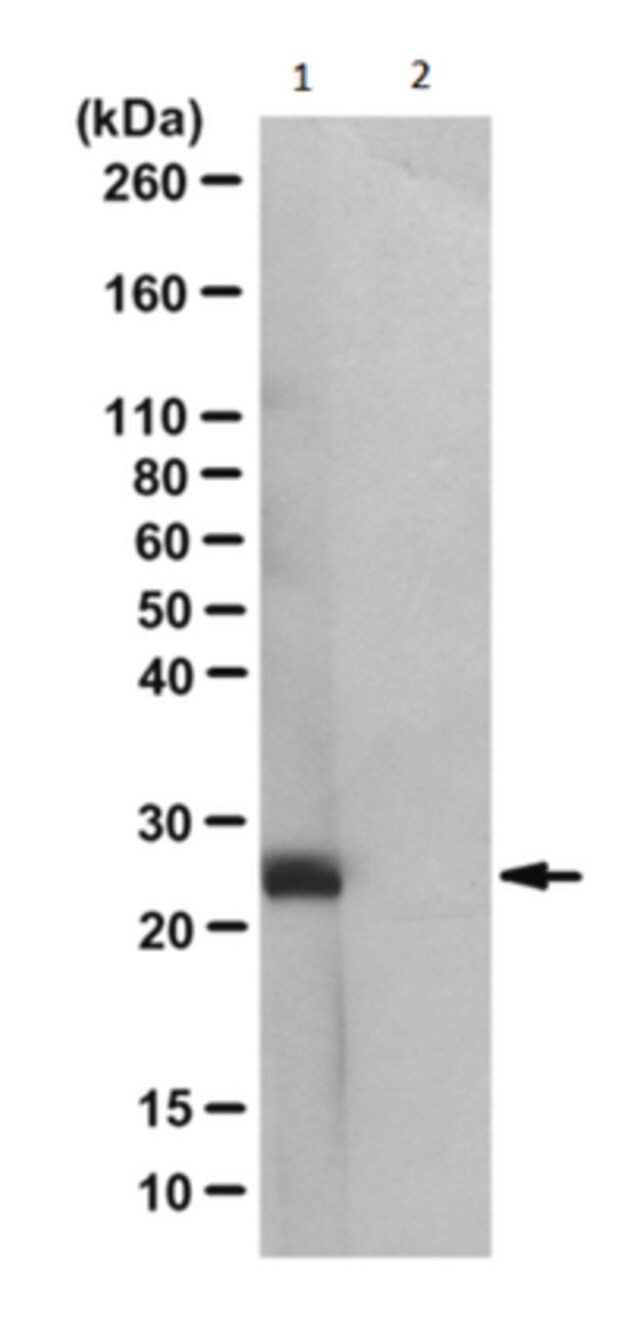您的位置:首页 > 产品中心 > Anti-N3-Phosphohistidine (3-pHis) Antibody, clone SC56-2
Anti-N3-Phosphohistidine (3-pHis) Antibody, clone SC56-2

产品别名
Anti-N3-Phosphohistidine (3-pHis) Antibody, clone SC56-2
N3-Phosphohistidine
基本信息
| eCl@ss | 32160702 |
| NACRES | NA.41 |
| General description【一般描述】 | Phosphorylation plays an important role in regulating protein activities and various cellular signaling events in cells. Limited by the tools available for phosphohistidine (pHis) detection, the majority of studies focus on serine, threonine, and tyrosine phosphorylations. Histidine phosphorylation can occur at either N1 (1-pHis) or N3 (3-pHis) of the imidazole ring. The development of peptides containing stable phosphoryltriazolylalanine analogues of 1-pHis and 3-pHis (1-pTza and 3-pTza) allows the generation of antibodies for studying both histidine N1 and N3 phosphorylations in signaling events. There is growing evidence implicating His kinases in cancer and tumor metastasis and the first metastasis suppressor gene identified is one of the two known mammalian His kinases, Nm23-H1 (also known as NME1, nucleoside diphosphate kinase, or NDPK-A). Nm23-H1/NME1 and the closely related Nm23-H2 (NME2/NDPK-B) catalyze the transfer of phosphate from ATP onto Nucleoside-diphosphates (NDPs) through a 1-pHis enzyme intermediate. Nm23-H1/-H2 also possess His kinase activity, transferring the phosphate from the active site pHis onto a His in a target protein. Metabolic enzymes such as phosphoglycerate mutase (PGAM), succinyl CoA synthase (SCS), and ATP citrate lyase (ACL) also use pHis as an enzyme intermediate. Unlike NME1/2, PGAM uses 3-pHis as an enzyme intermediate. In addition to eukaryotes, histidine phosphorylation is well documented in bacterial “two-component” signaling pathways involved in chemotaxis, although the phosphate is transferred from the pHis formed in the receptor/sensor protein to Asp residues of an acceptor response regulator protein, and the receptor/sensor protein essentially functions as an aspartate kinase. |
| Specificity【特异性】 | Target modification is not species specific. Selectively detects proteins with histidine(s) phosphorylated at N3 of the imidazole ring (3-pHis), but not 1-pHis. |
| Application【应用】 | Anti-N3-Phosphohistidine (3-pHis) antibody, clone SC56-2 is an isomer-specific monoclonal Ab to specifically detect histidine phosphorylated at position N3. This purified mAb is backed by published data demonstrating performance in Western blotting and dot blot applications. Dot Blot Analysis: A representative lot detected peptides containing 3-pTza phosphohistidine analogue, but not peptides containing only phosphorylated tyrosine. Clone SC56-2 is most reactive toward 3-pTza peptides based on NM23-H1/NME1 3-pHis118 and PGAM 3-pHis11 sequence, less reactive toward 3-pTza peptides based on ACLY 3-pHis760, histone H4 3-pHis18, or Kca3.1 3-pHis358 sequence, while being least reactive toward GNB1 3-pHis266-based 3-pTza peptide (Fuhs, S.R., et al. (2015). Cell. 162(1):198-210). Western Blotting Analysis: Clone SC56-2 hybridoma culture supernatant was employed for Western blotting analysis of heat-sensitive histidine N3-phosphorylation (3-pHis) of exogenously expressed human PGAM GST fusion protein in lysates from transformed E. coli (Fuhs, S.R., et al. (2015). Cell. 162(1):198-210). Note: DO NOT HEAT SAMPLES prior to phosphohistidine detection. Histidine phosphorylation is heat and acid labile. To generate negative control for specificity test, an aliquot of sample can be heated at 95ºC for 10-15 minutes to reverse histidine phosphorylation. Alternatively, an aliquot of sample can be incubated under acidified pH at 37ºC for 15 minutes to reduce histidine phosphorylation. Acidify each 100 µL sample with 25 µL of 1 M HCl before the incubation, then neutralize with 25 µL of 1 M NaOH prior to phosphohistidine detection. |
| Quality【质量】 | Evaluated by Western Blotting of PGAM-catalyzed 2,3-DPG degradation reaction. Western Blotting Analysis: 0.52 µg/mL of this antibody detected recombinant human phosphoglycerate mutase (PGAM) with N3-phosphohistidine (3-pHis) in a 5 µg aliquot of PGAM-catalyzed 2,3-diphosphoglycerate (2,3-DPG) degradation reaction. |
| Physical form【外形】 | Protein A purified Format: Purified |
| Other Notes【其他说明】 | Concentration: Please refer to lot specific datasheet. |
产品性质
| biological source【生物来源】 | rabbit |
| Quality Level【质量水平】 | 100 |
| antibody form【抗体形式】 | purified antibody |
| antibody product type | primary antibodies |
| clone【克隆】 | SC56-2, monoclonal |
| species reactivity | E. coli, human |
| species reactivity (predicted by homology) | all |
| technique(s) | dot blot: suitable western blot: suitable |
| isotype【同位素/亚型】 | IgG |
| shipped in【运输】 | wet ice |
产品说明
| Target description【目标描述】 | Variable depending on the histidine-phosphorylated proteins. |
| 【免责声明】 | Unless otherwise stated in our catalog or other company documentation accompanying the product(s), our products are intended for research use only and are not to be used for any other purpose, which includes but is not limited to, unauthorized commercial uses, in vitro diagnostic uses, ex vivo or in vivo therapeutic uses or any type of consumption or application to humans or animals. |
安全信息
| Storage Class Code【储存分类代码】 | 12 - Non Combustible Liquids |
| WGK | WGK 1 |




